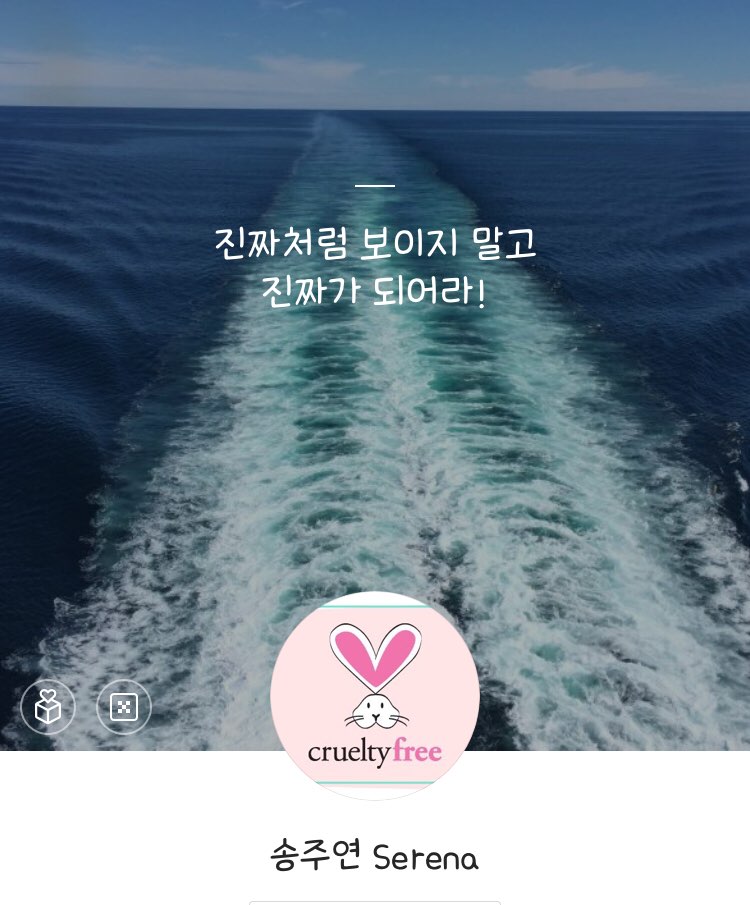How often do I put my beliefs into action? I found myself wondering about this recently. I’ve been a vegetarian since fourth grade, and tend to be extremely sensitive when it comes to cruelty to, or thoughtlessness about, other living things.
Recently, however, I realized that though reading articles on animal rights would enrage me, the anger would never translate to concrete steps in real life. So I decided to stop using products that rely on animal testing.
The first thing I did after making the decision was to change my Kakao Talk profile picture. I downloaded the cruelty-free logo and made it my profile picture. Then I wrote “Don’t look real. Be real” as my status message.
Then I felt strange. Why did I change my status to that? I could have just written it down in my diary, or just kept it in my head. When I thought more about it, I realized that this wasn’t the first time. For some time, I’ve been changing my Kakao Talk profile whenever I resolved to do something.
[The Parent] For an ideal self
Since the early days, psychoanalysts have classified the psyche into three parts. Sigmund Freud called them superego, ego, and id. Based on the Freudian theory, Eric Berne, who developed the concept of transactional analysis, argued that there are three ego-states that make up personalities—the Parent, Adult, and Child. The Parent values ideal and morals; the Adult thinks objectively and appraises reality; and the Child reflects emotions and desires.
Eric Berne said that people have all three ego-states, but one of these states plays a dominant role in people’s behavior.
My Kakao Talk friends are in their 30s and 40s, and what they most wish to express is their ideal selves. With status updates like “I can do it”, “letting go”, “a little more”, and “it’s okay”, they express a resolve to better themselves.
Sometimes, they console or encourage themselves by using pictures of people they want to emulate, pictures symbolic of their goals, or pictures of places they want to travel to as their profile images. My decision to upload the cruelty-free logo also puts me into this group.
Such actions are close to the state of the Parent, according to Eric Berne. The Parent places much importance on morality and ideals. There are subdivisions within the ego-state, and thus the Parent can be more “critical”, leading someone to live up to their ideals, or “nurturing,” offering consolation and taking care of themselves and others.
The Kakao Talk status messages that push someone, such as “I can do it” or “a little more” can be considered as expressions of the critical Parent while encouraging messages like “It’s okay” and “*pat pat*” are expressions of the nurturing Parent.

The first thing I did after resolving to act on protecting the rights of animals was change my Kakao Talk profile. My status reads, “Don’t look real. Be real.” | ⓒ Song Jooyeon
[The Adult] Focus on the here and now
Many other people use their Kakao Talk profiles to express their present state of mind. Some of my friends put up their to-dos: “Revise and submit the plans”, “Remember to get the family register”, “Pick up daughter at 2”. They look at their profiles several times a day so the status messages serve as helpful reminders, and sometimes fellow users check in on their progress. Such people use their profiles as a way of staying focused on the present.
And more than a few use Kakao Talk to promote their businesses. The director of a private academy uses a photo of her school and its phone number as her profile picture and status message. She occasionally uploads details of new classes too.
The owner of the fruit shop I frequent uploads the pictures of the freshest and most delicious fruits of the day to promote his shop. A friend who owns a dog grooming shop promotes her business with pictures of cute animal companions and the status message “Consultations via Kakao Talk are welcome”.
People who reflect their present in their profiles are most likely to have dominant Adult egos. According to Eric Berne, the Adult ego is a state that thinks objectively and appraises reality.
The Adult mediates between the Parent, who chases after ideals, and the Child, who acts on impulses, and helps you adjust to the present. People who use their Kakao Talk profiles for matters of practicality are likely to be highly adaptable to changing situations, to focus on the here and now, and to be happy with their present circumstances.
[The Child] Feel for me

What everyone who uses Kakao Talk profiles ultimately wants is the feeling that they are not alone—a sense of connectivity | Kakao Talk
Other people use their profiles to express their emotions. Many set their statuses to feelings like “Sadness today”, “Happy”, “Extremely annoyed”, or “Outraged”. When I’m scrolling my friends list and come across status messages like these, I often ask the friend how they’re doing. After all, these messages read as calls for someone to listen, to console, or to share their joy.
I presume that people who express their feelings on their profiles have a stronger Child. The Child ego comprises the “natural” state, in which someone freely expresses their feelings, and the “adapted” state, in which someone restrains their feelings to obey parents or other authority figures.
People with a stronger natural Child ego tend to express their feelings directly and then quickly shake them off. They are unlikely to care if their emotional status messages garner no reaction.
On the other hand, people with a stronger adapted Child ego tend to have difficulty expressing themselves honestly in their lives. When such people express their feelings on Kakao Talk profiles, they are probably indirectly informing others of their unspoken feelings. And they do this because they want their friends to read their status messages and understand their feelings.
When their friends don’t reach out to them, these users are likely to feel sad and have even more difficulty expressing themselves. So when you see emotional status messages on the Kakao Talk profiles of close friends, it is important to show that you care and ask after them.
Kakao Talk has become an indispensable part of Korean life. And, instead of simply showing usernames, Kakao Talk profiles now function as ways for people to express themselves and reveal their innermost desires. Not everyone uses the function, of course. Many people are uncomfortable with the idea of their profile automatically showing up on the phone of anyone who happens to have their number. But many do, and we’ve looked at a psychological explanation on why:
People who wish to manage their growth through their Kakao Talk profiles (Parent) expect encouragement and consolation; those who express their current state (Adult) seek practical support; and those who express their feelings (Child) crave emotional sympathy.
In the end, what everyone who uses the Kakao Talk profile function wants is the feeling that they are not alone—a sense of connectivity. Pursuing a sense of even superficial connection through Kakao Talk profiles may be a sign that our society is yearning for true affection.
But this doesn’t have to be a bad thing. If people become more connected, share their values, and support each other, even through Kakao Talk profiles, this world might end up a warmer, better place.
Have a question for the writer? Send us a mail or sign up for the newsletter.
More at The Dissolve
- Defence minister criticized over remarks on Pohang helicopter crash
- With the 52-hour workweek now in effect, nights are getting busier for the working class
- Playwright and director Choi ZinA: “Uncomfortable? Unfamiliar? Then I’ve done my part.”
- A former reporter on the future of longform and what Korea has to contribute
- Thinking through a shared problem: child abuse in Korea and the US


